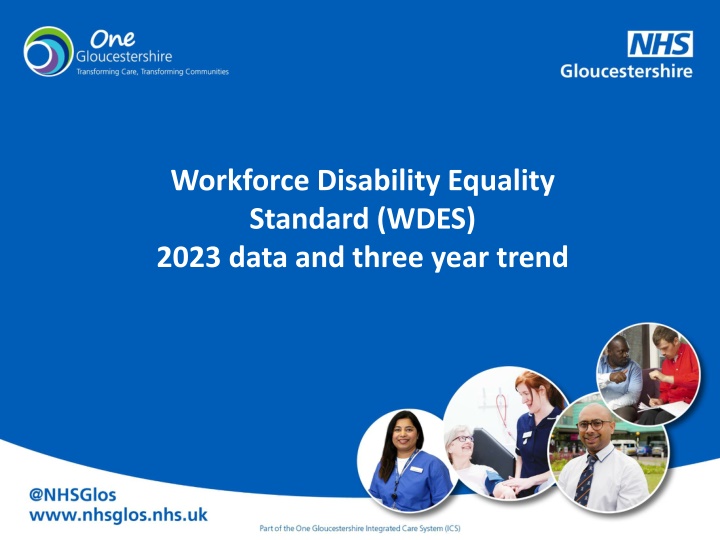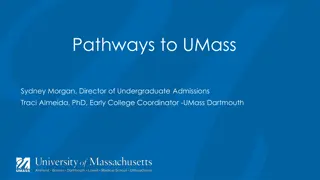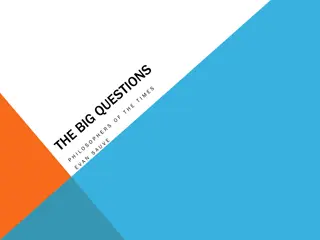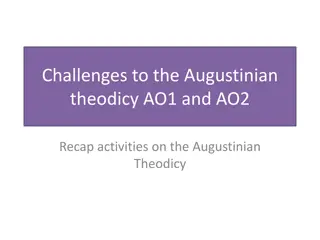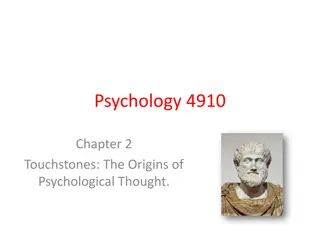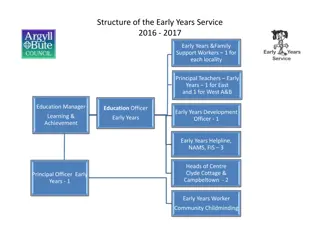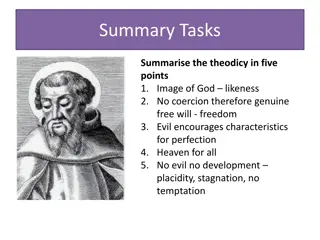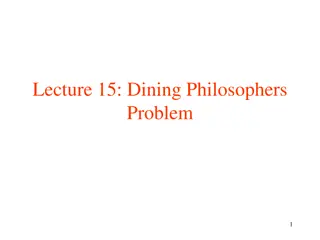Modern Theodicy: Early Modern Philosophers and Theodicy Problem
Early modern philosophers like Pierre Bayle, David Hume, Thomas Hobbes, and Gottfried Leibniz grappled with the problem of theodicy, exploring questions of evil, skepticism, and human nature. These thinkers presented diverse perspectives on the relationship between religion, science, and ethics, shedding light on the complexities of existence and the nature of God.
Download Presentation

Please find below an Image/Link to download the presentation.
The content on the website is provided AS IS for your information and personal use only. It may not be sold, licensed, or shared on other websites without obtaining consent from the author.If you encounter any issues during the download, it is possible that the publisher has removed the file from their server.
You are allowed to download the files provided on this website for personal or commercial use, subject to the condition that they are used lawfully. All files are the property of their respective owners.
The content on the website is provided AS IS for your information and personal use only. It may not be sold, licensed, or shared on other websites without obtaining consent from the author.
E N D
Presentation Transcript
Workforce Disability Equality Standard (WDES) 2023 data and three year trend 1
The WDES is a combination of data derived from workforce systems i.e. ESR (staff self-disclosure) and the National Staff Survey for the year. The following data is obtained from the ICB workforce system as follows: Percentage of disabled staff employed Relative likelihood of disabled compared to non-disabled staff member being appointed into an ICB job Percentage of disabled staff in each of the Agenda for Change pay bands Relative likelihood of disabled compared to non-disabled staff member entering a capability process Percentage of board members (ICB Board) who are disabled There are a range of questions that were responded to in the 2022 National Staff Survey reported in March 2023 (slides 4 8) such as the % of disabled staff who have experienced bullying and harassment from patients / service users and families / colleagues / managers as well as questions. The percentage of staff who believe the organisation provides equal opportunities, values their work, made reasonable adjustments to their work. 2
How to read the infographic To note: according to the 2021 Census 16.8% of Gloucestershire residents reported having a long-term limiting health problem or disability https://www.gloucestershire.gov.uk/media/uxvcfrsp/equality-profile-2023.pdf Over the last three years the ICB has on average employed 3.35% of disabled staff The data shows the % of staff in clinical and non-clinical roles who are disabled compared to those who do not have a disability in the following pay bands Pay band 4 and below Pay bands 5 -7 Pay bands 8a to 8b Pay bands 8c + and VSM For 2023 non-clinical roles - the majority of disabled staff were employed in pay bands 4 and below and there were 0 in pay bands 8c+ and VSM For 2023 clinical roles the majority of disabled staff were employed in pay bands 5-7 and 0 for the other pay bands In 2023 the ICB does not employ any disabled board members compared to previous years For the last three years on average those candidates without a disability were more likely to be appointed for a job within the ICB than disabled candidates For the last three years disabled staff were more likely to enter the formal capability process compared to staff without a disability. NB. The information on equalities is obtained from the ICB s staff records system called ESR and is based on staff disclosure. Not all staff choose to disclose and it is highly likely the % of disabled staff the organisation employs is under-reported. 3
Workforce Disability Equality Standard 1. Percentage of staff experiencing harassment, bullying or abuse from patients/service users, relatives, or the public in the last 12 months: 2020 2021 2022 17.1% 17.4% 11.7% 12.8% 10.1% 7.8% 11.4% 12.0% 10.7% 8.7% 8.0% 7.3% 41 46 60 180 189 217 2. Percentage of staff experiencing harassment, bullying, or abuse from managers in the last 12 months: 2020 2021 2022 24.4% 17.4% 8.3% 7.7% 3.7% 5.6% 16.9% 12.7% 15.2% 8.7% 7.2% 7.6% 41 46 60 181 189 216
Workforce Disability Equality Standard 3. Percentage of staff experiencing harassment, bullying or abuse from other colleagues in the last 12 months: 2020 2021 2022 19.5% 13.3% 15.0% 8.3% 5.3% 5.1% 18.0% 15.6% 15.5% 9.1% 8.1% 8.7% 41 45 60 181 188 216 4. Percentage of staff saying that the last time they experienced harassment, bullying, or abuse at work, they or a colleague reported it: 2020 2021 2022 35.3% 18.8% 53.3% 62.2% 65.3% 64.7% 55.5% 46.2% 40.9% 43.2% 46.4% 42.2% 17 16 16 37 27 27
Workforce Disability Equality Standard 5. Percentage of staff who believe that their organisation provides equal opportunities for career progression or promotion: 2020 2021 2022 51.2% 61.7% 53.3% 62.2% 65.3% 64.7% 55.5% 56.5% 50.0% 61.5% 63.0% 57.6% 43 47 60 188 190 215 6. Percentage of staff who have felt pressure from their manager to come to work, despite not feeling well enough to perform their duties: 2020 2021 2022 29.2% 25.0% 18.9% 11.9% 5.6% 11.0% 19.8% 15.0% 15.6% 12.7% 11.2% 11.0% 24 28 37 59 54 82
Workforce Disability Equality Standard 7. Percentage of staff satisfied with the extent to which their organisation values their work: 2020 2021 2022 48.8% 46.8% 43.3% 51.7% 66.8% 65.9% 49.4% 51.1% 45.6% 59.8% 58.9% 52.8% 43 47 60 189 190 217 8. Percentage of staff with a long-lasting health condition or illness saying their employer has made an adequate adjustment(s) to enable them to carry out their work: 2022 92.3% 80.4% 26
Workforce Disability Equality Standard 9. Staff engagement score (0-10): 2020 2021 2022 7.2 7.3 7.3 6.9 6.9 6.9 7.3 7.5 7.4 6.9 6.9 6.6 7.3 7.2 7.0 43 47 60 189 190 217
Key Actions in 2023 Programme of ED&I training all staff including at induction with a dedicated programme on Building a Culture of Conscious Inclusion programme kicked off in February 2023 to run for nine months with: 6 in person sessions (F-2-F) x half day for 140 leadership (Band 8+ and Board) 10 Module 1 virtual sessions x 1 hr sessions for 200 (Band 2-7), with a month gap in between for reflection. 10 Module 2 virtual sessions x 1 hr sessions for 200 (Band 2-7) New Appraisal Paperwork and training including an ED&I objective Managers training on health and wellbeing being delivered by Susan Doran each month, raising awareness of long term health conditions and supporting employees within the workplace including women s health, MSK conditions etc Continue to promote flexible working options and work life balance including the Other Leave policy and include Disability Leave in the Reasonable Adjustments policy Produced the Health Passport and Guidance Produce the Reasonable Adjustments Policy including Disability Leave Produce the Policy on Zero Tolerance to Abuse to NHS staff set up a reporting system and confidential mailbox Produce Freedom to Speak Up Policy and ensure programme of education and publicity around FTSU increase capacity in FTSU Continue to participate in the range of ICS ED&I programmes including Reciprocal Mentoring, Allyship Programme and Flourish Scheme 10
